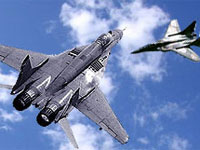Russia enjoys comparative advantage over the U.S. in terms of defense
The U.S. Congressional Research Service estimated Russian arms sales as worth $7.1 billion in its report "Conventional Arms Transfers to Developing Nations, 1998-2005."

The CRS, surprisingly to American eyes, ranked France, not the United States, as the second-largest arms exporter with 2005 sales worth more than $6.3 billion, just ahead of the United States with $6.3 billion.
Pravda.Ru asked Andrew J. Grotto, Senior National Security Analyst at the Center for American Progress, and Gabriel Ben-Dor, Director of the National Security Studies Center at the University of Haifa, to comment on this.
Pravda.Ru: How could you comment on this?
Andrew Grotto: Arms exports serve three main purposes. First, they are a source of export income. The defense industry is, after all, an industry, and even when specific sectors are owned by the government, there is still a profit motive. Moreover, the availability of an export market may be key to the survival of some defense industry sectors, because the domestic market isn't large enough to support the significant sums of money that must be spent researching and developing cutting-edge military technology. Second, arms exports can be a useful way to buy friends and allies, particularly in the target country's military establishment. (For instance, this is a key rationale behind U.S. exports of military hardware to Pakistan.) Third, arming a friend or ally better positions that ally to defend itself or uphold regional security.
Gabriel Ben-Dor: Russia has been a large arms exporter for a long time, going back to the period of the existence of the Soviet Union. Russia has produced arms that are explicitly geared to exports, and they are suitable for the needs of many countries in the so-called Third World, which is one main reason for the success of the export project. There is also a matter of price and conditions, as the American arms tend to be far more expensive, and also more difficult to maintain, supply with spare parts etc. France has been an aggressive producer also for many years, going back to the fifties.
Pravda.Ru: Does it mean that Russian arms are much better that American?
Gabriel Ben-Dor: There is not much point in trying to determine which arms are "better". The point is to produce arms which are suited to the specific needs of a given country at an affordable price, and many American products tend to be complicated and expensive.
Andrew Grotto: It does not. Russia's defense industry is extraordinarily talented, and probably enjoys a comparative advantage vis-a-vis the United States in some discrete areas. But overall, I wouldn't say it is "better" than America's industry. The truth is that the United States spends so much money on defense that it's technological capabilities are unparalleled. As we say in America, you get what you pay for.
The export data is better interpreted as a reflection of each country's export policy, and not the relative quality of Russian versus French versus Indian versus American technology. Every country has a different weapons export policy -- items they will export, items they will not export, who they will export to, who they refuse to export to, etcetera. This has a huge impact on the quantity and pattern of their arms exports.
Pravda.Ru: How can you describe today’s American tendencies in the field of national security?
Gabriel Ben-Dor: American tendencies in the field of national security are difficult to pinpoint, since the United States is in a situation of re-assessment, given the difficulties of its presence in Iraq and Afghanistan, the difficulty of exerting pressure on Iran and the uncertainty about the future of relations with Russia, in the light of the controversy over the deployment of NATO presence and missiles in Eastern Europe. It will be possible to make a statement on this only after the elections for the US presidency next year.
Andrew Grotto: I could write a book on American tendencies in the field of national security! (Maybe I will someday...) But I'll confine my thoughts here to just a few sentences. First and foremost, the Bush doctrine of preventive war against supposedly undeterable enemy states is dead. The botched war in Iraq was the coffin, and the recent NIE on Iran -- which suggests that Iran's leaders are deterable -- is the nail that seals it shut. So now there is a debate over what should replace it.
In general, what I think will -- and should -- emerge in the coming 5-10 years is a national security policy that combines the best elements of the pragmatic foreign policy championed by the 1989-1993 presidential administration of President George W. Bush's father and of the values-conscious foreign policy of the Clinton administration, particularly in the final years of that administration.
In terms of U.S.-Russia relations, my hope is that this produces a new strategic dialogue on a range of issues, including arms control. A great place to start (no pun intended) would be to negotiate a successor agreement to START, which expires in 2009.
Prepared by Alexander Timoshik
Pravda.Ru
Subscribe to Pravda.Ru Telegram channel, Facebook, RSS!


